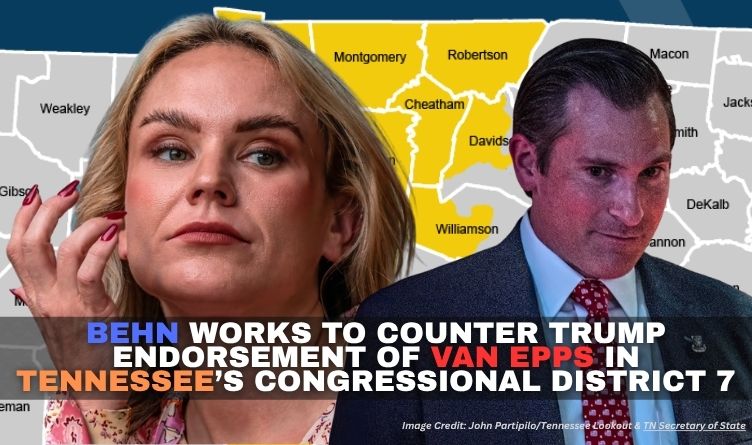Democrat faces uphill fight in District 7 special election, rated as heavily Republican by nonpartisan analysts.
Image Credit: John Partipilo/Tennessee Lookout & TN Secretary of State
***Note from The Tennessee Conservative: This article posted here for informational purposes only.
By Sam Stockard [Tennessee Lookout -CC BY-NC-ND 4.0] –
The special election for Tennessee’s 7th Congressional District seat is shaping up as a classic conservative-liberal battle that pits urban versus rural voters in a heavily red region.
The Democrat primary winner, state Rep. Aftyn Behn of Nashville, recently picked up endorsements from the Tennessee AFL-CIO and the Tennessee Immigrant and Refugee Rights Coalition’s political arm for her support of fair wages, the right to organize and efforts to cut costs, mainly by reducing the sales tax on groceries.
But the Republican primary victor, former Tennessee General Services Commissioner Matt Van Epps, holds endorsements from Gov. Bill Lee, former Rep. Mark Green, whom he is trying to replace, and President Donald Trump.
The president’s support for Van Epps just days before the primary vote gave him the edge over Rep. Jody Barrett and pushed Rep. Lee Reeves out of the race.

In a district rated solid Republican by the nonpartisan Cook Political Report, Van Epps holds a considerable advantage over Behn, a community organizer and political consultant who lives just outside District 7 and would have to move if elected. Tennessee lawmakers reshaped the district four years ago, watering down blue voters in Davidson County by dividing it between three districts and adding large numbers of red voters from rural areas.
Behn has been undaunted, though, in skirmishes with Republican lawmakers at the State Capitol, even partnering with conservatives such as Rep. Todd Warner on some matters.
Asked how she plans to overcome Trump’s endorsement of Van Epps, a former Army special operations combat pilot, in the Dec. 2 election, Behn said she will play on Van Epps’ support for “Washington Republicans’ toxic agenda of cutting rural healthcare and exploding the deficit in order to cut taxes for billionaires.”
Behn also said she’ll go after Van Epps for backing tariffs that are “making everyday items more expensive for Tennesseans” and noted she is running to “reverse the damage of the ‘one big BS bill’ and lower costs,” in a reference to Trump’s One Big Beautiful Bill.
The nation’s inflation rate is 2.9% higher than the past year’s, and many Tennessee soybean farmers say they’re struggling to pay bills, mainly because of Trump’s tariffs on China.
Van Epps’ campaign didn’t answer questions from the Lookout for this article. But Americans for Prosperity – Tennessee said his victory shows grassroots conservatives “value” the president and his agenda, which includes “school choice.” Tennessee is pouring $144 million into Gov. Bill Lee’s private-school voucher program for 20,000 students this year, and some leaders are pushing for expansion in 2026.
Shortly after Trump’s endorsement, Van Epps issued a statement saying, “it’s time to send a servant-leader to Washington who will keep our border secure, lower the cost of living, defend our freedoms and deliver for Tennessee’s 7th District.”
Another group, U.S. Term Limits, praised Van Epps for signing a pledge to vote in favor of legislation limiting members of Congress to three House terms and two Senate terms.
Green won the last two elections by 20 percentage points over Democrat opponents even though he criticized Republicans’ redistricting plan, which put a large number of Davidson County blue voters into the 7th.
Behn could take heart in that Democrats cast 31,000 ballots in the recent Democrat primary, compared to Republicans’ 36,000 in a hotly contested race.
The 7th Congressional District covers the northwest portion of Nashville, which is typically a Democrat stronghold, but it also stretches across rural counties from the Alabama state line to Kentucky, from Wayne to Montgomery County where Van Epps was based at Fort Campbell, and part of heavily red Williamson.

Van Epps won 51.6% of the primary to Barrett’s 25% and Rep. Gino Bulso’s 10.9%. Yet he was barely leading until Trump made his endorsement.
Van Epps, who also serves in the National Guard as a lieutenant colonel, tied his primary race directly to the president, saying in some ads he was going to do battle with “woke” liberals in Washington, D.C.
He brought in $402,000, including a $178,800 loan, during the primary reporting period and spent $347,700. He has $54,300 on hand.
Van Epps’ campaign was buoyed by $700,000 in independent spending from the pro-private-school voucher group, Club for Growth, which ran attack ads against Barrett.
Van Epps also received independent spending support from American Liberty Foundation, $383,800; American Patriots, $329,800; and Patriotic Fund, $198,800; the Tennessee Journal reported.
Behn picked up 27.9% of the primary vote over businessman Darden Copeland, 24.9%; Rep. Bo Mitchell, 24.2%; and Rep. Vincent Dixie, 23.1%. She netted more than $188,000 in contributions, including a $6,900 loan, and spent nearly $168,000, leaving her campaign with $20,168 for the general election.




2 Responses
Yup, Crashville’s accursed dimmercraps, killing TN.
As if an endorsement from the felon is a positive. Stop voting against yourselves Tennessee!!!